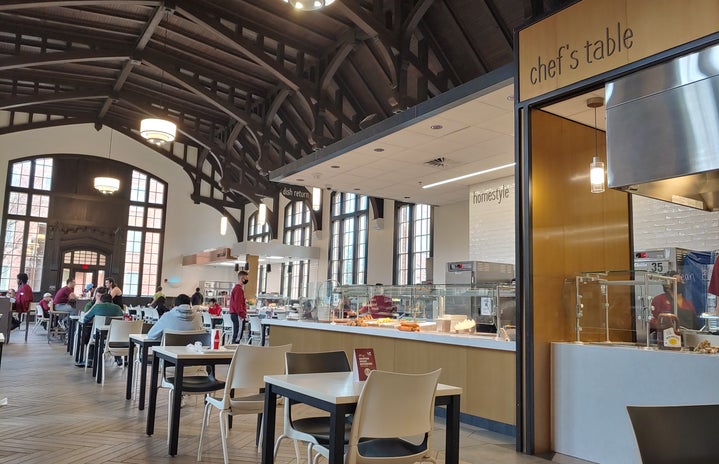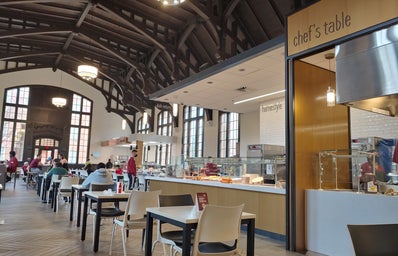Many across Leon County struggle with food insecurity. What is food insecurity? Food insecurity is defined as a consistent struggle to obtain enough nutritious meals to lead a healthy life.
Why should Florida State University (FSU) students care about food insecurity?
According to a survey completed by Former Representative Al Lawson’s office in 2019, a staggering 41 percent of FSU students were experiencing food insecurity. That’s roughly 18,653 students. The number has only increased from the stress of a global pandemic. I cannot say I am surprised. A meal swipe equivalency from Seminole Dining is supposed to be $6, but just three chicken tenders from The Den costs $6.33 and a meal at the Suwannee Room costs $10!
What causes food insecurity?
There are two main components of food insecurity: availability and accessibility. On the FSU campus, most of our students experience the latter: accessibility. The prices of food, the ability to drive off campus to a grocery store and the time to make a well-balanced meal are all privileges.
Availability isn’t a great concern on the FSU campus because we aren’t a food desert. FSU Campus offers all of the Seminole Dining options including 19 restaurants, three Starbucks, four convenience stores and even a bar (that serves both alcoholic drinks and bar food)! Nearby campus, there is a Publix, GreenWise and plenty of fast food restaurants within walking distance. Stores like Walmart and Aldi are a short drive away. But if availability isn’t as big of an issue, then what is?
Accessibility is the more prevalent issue in Tallahassee, and there are a few reasons why.
- Food prices are rising every day. Just like gas prices, textbook prices, rent and everything else suffering from inflation, food is becoming a luxury. Many students simply cannot afford food.
- If you don’t have a car, you cannot access groceries. This is the blunt truth. Many Uber drivers are comfortable with a few grocery bags but not a week’s worth. Furthermore, most of the time Uber rides can cost upwards of $15 just for a drive from the stadium to the Ocala Publix! At the end of the day, students cannot be expected to walk more than a mile and then carry ten to fifteen bags of groceries home. This leads to many students feeling pressured to eat the fast food on campus or DoorDash their meals, a tactic that gets pricey quickly.
- Many students lack the time! Between classes, part-time jobs, clubs/organizations on campus, chores, etc., many students simply do not have the time to go to the grocery store. This dilemma also leads to more students being unable to obtain nutritious and high-density foods.
What resources are available to help hungry students?
Food for Thought Pantry
The FSU Food for Thought Pantry is located in University Center A, Suite 4148. The pantry is partnered with Second Harvest of the Big Bend to keep the shelves and freezers stocked. They will not ask any questions to determine “need.” All they ask of you is that you swipe your FSUCard. This is a great resource for shelf-stable food items. Examples include microwavable mac and cheese, beans, basic produce and more.
Shabbat at Hillel at FSU
Hillel FSU is an organization that aims to serve Jewish college students. They serve free dinners every Friday as a part of their religious services. Hillel at FSU also bakes Challah for donations on a semi-regular basis. This is a great resource for any Jewish FSU students who may be hungry. Unlike many other student organizations, they help combat food insecurity with more than just the occasional pizza slice to lure new members. They are truly helping students in need.
SNAP Benefits are now accepted at FSU
The recent expansion of the Supplemental Nutrition Assistance Program (SNAP) allows college students who are enrolled at least half-time (six credits) to be temporarily eligible for SNAP benefits, provided they meet all other eligibility criteria. FSU established Electronic Benefits Transfer (EBT) card terminals in qualifying locations on campus to help students facing food insecurity. Since February 2022, the terminals have been available to students who are eligible for SNAP benefits.
Combatting hunger on campus happens one step at a time.
Want to see more HCFSU? Be sure to like us on Facebook and follow us on Instagram, Twitter, TikTok, YouTube, and Pinterest!


